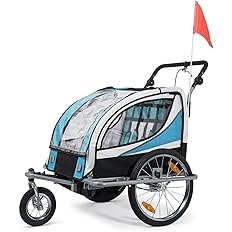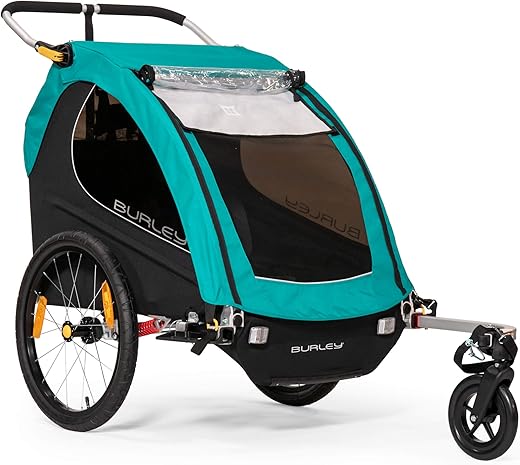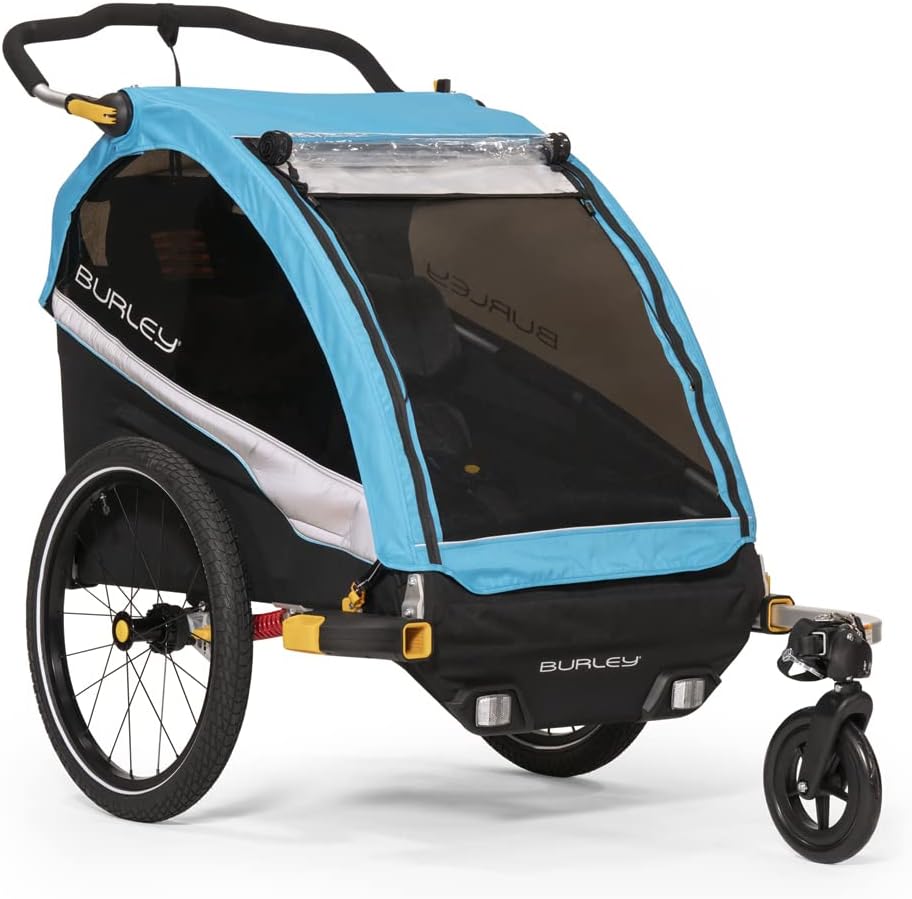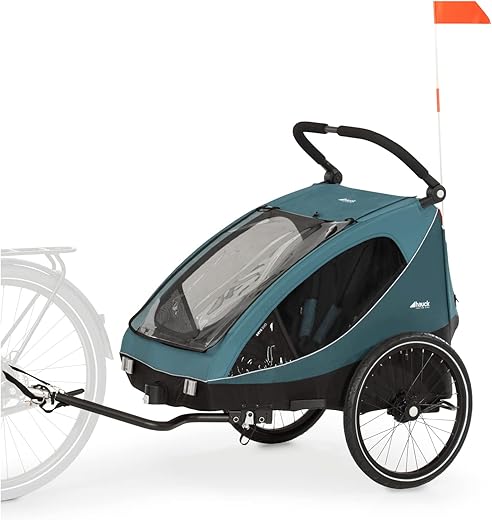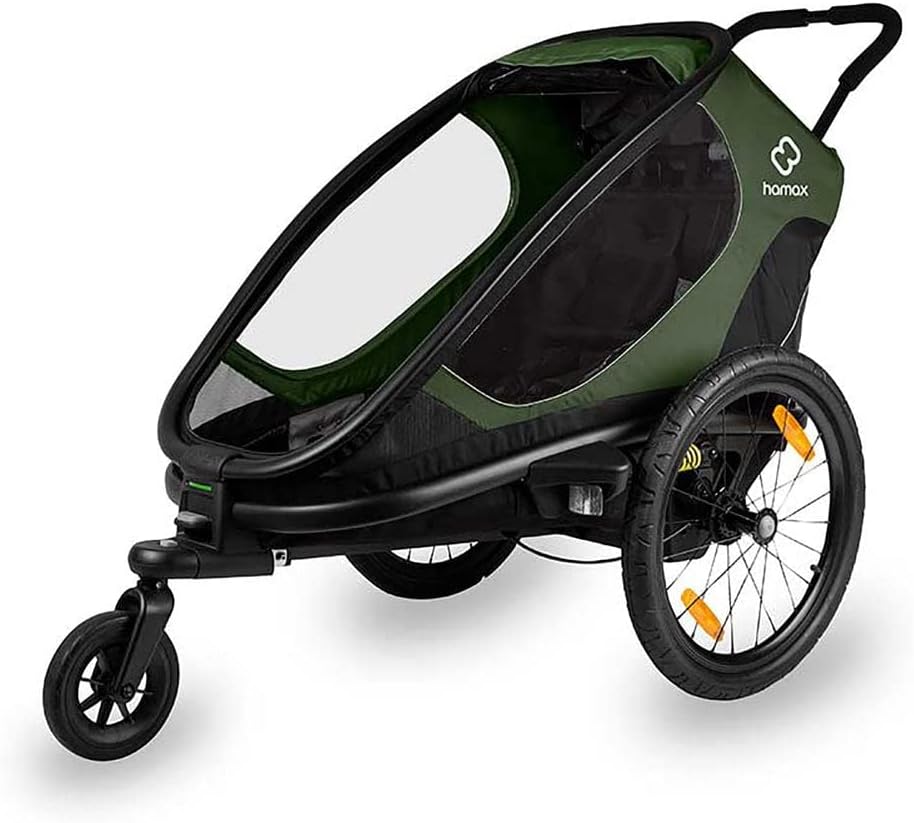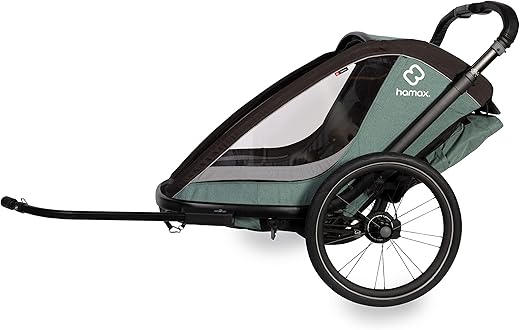
Introduction
As a parent, you want to share your love for cycling with your children, but safety is always a top priority. One popular option for transporting kids while cycling is a bike trailer. These convenient contraptions allow you to bring your little ones along for the ride, providing a safe and comfortable space for them to enjoy the outdoors. But at what age can kids safely ride in a bike trailer? In this ultimate guide, we will explore the benefits of using a bike trailer for kids, safety considerations, age guidelines, and physical development milestones, and offer tips for safe and enjoyable rides. So, let’s dive in and find out when your kids can hop on board!
What is a Bike Trailer?
Before we delve into the details of when kids can safely ride in a bike trailer, let’s first understand what a bike trailer is. A bike trailer is a specially designed attachment that can be hitched to the back of a bicycle. It provides a secure and enclosed space for one or two children to sit comfortably while being towed by the cyclist. Bike trailers are typically made with a sturdy frame, durable fabric, and safety features such as harnesses and protective coverings. They come in various sizes and designs to accommodate different age groups and needs.
Benefits of Using a Bike Trailer for Kids
Using a bike trailer for kids offers numerous benefits for both parents and their little ones. Firstly, it allows you to spend quality time together as a family while engaging in a fun and healthy outdoor activity. Cycling not only promotes physical fitness but also encourages a sense of adventure and exploration in children. Moreover, bike trailers provide a comfortable and secure space for kids to ride, ensuring their safety during the journey. They are equipped with safety features such as seat belts, roll cages, and weather-resistant coverings to protect children from potential hazards and adverse weather conditions. Additionally, bike trailers have ample storage space, enabling you to carry essential items such as snacks, water bottles, and extra clothing for your child.
Safety Considerations for Riding in a Bike Trailer
Safety should always be the top concern when it comes to riding in a bike trailer with your kids. Here are some important safety considerations to keep in mind:
Proper Helmet Use
Just like when riding a bicycle, it is crucial for both the cyclist and the child passengers to wear properly fitting helmets. Helmets provide vital protection in case of a fall or collision and should always be worn correctly.
Secure Attachment
Before setting off on your bike trailer adventure, ensure that the trailer is securely attached to your bicycle. Double-check the hitch and make sure it is properly connected and locked in place. Additionally, inspect the trailer’s wheels, brakes, and other components to ensure they are in good working condition.
Visibility
Enhance your visibility on the road by attaching reflective materials to your bike and trailer. Reflective stickers, lights, and flags can make you more noticeable to other motorists, especially in low-light conditions.
Avoid Busy Roads
When riding with your kids in a bike trailer, it is advisable to stay away from busy roads or intersections. Choose quieter routes such as bike paths, parks, or residential areas with less traffic. This reduces the risk of accidents and provides a more enjoyable experience for everyone.
Weather Conditions
Pay attention to the weather forecast before embarking on your bike trailer adventure. Avoid riding in extreme weather conditions such as heavy rain, strong winds, or extreme heat. Unfavourable weather can make the ride uncomfortable and potentially unsafe for your child.
Age Guidelines for Riding in a Bike Trailer
Now that we have covered some general safety considerations, let’s discuss the age guidelines for riding in a bike trailer. It is important to note that different bike trailers have specific age recommendations, so always refer to the manufacturer’s guidelines for your particular model. However, here are some general guidelines to consider:
Infants (0-12 months)
Most bike trailers are not suitable for infants under the age of 12 months. Infants have limited neck strength and may not be able to support their heads properly during the ride. It is recommended to wait until your child reaches the age of 1 year before using a bike trailer.
Toddlers (1-3 years)
Once your child reaches the age of 1 year and has good neck control, they can start riding in a bike trailer. Toddlers can sit comfortably in the trailer and enjoy the ride while being safely secured with the provided harnesses.
Preschoolers (3-5 years)
Preschoolers can continue riding in a bike trailer until they are old enough to ride a bicycle independently. As long as your child fits comfortably in the trailer and meets the weight and height requirements, they can enjoy the benefits of riding in a bike trailer.
Physical Development Milestones for Riding in a Bike Trailer
Apart from age, it is essential to consider your child’s physical development milestones before allowing them to ride in a bike trailer. Here are some milestones to consider:
Neck and Head Control
Before riding in a bike trailer, your child should have sufficient neck and head control. This means they can hold their head steady and maintain proper posture while sitting upright. Neck and head control are crucial for their safety and comfort during the ride.
Ability to Sit Unassisted
Your child should be able to sit unassisted without needing additional support. This indicates that their core muscles have developed enough to maintain a stable sitting position throughout the ride.
Balance and Coordination
While riding in a bike trailer, your child may experience minor bumps and movements. They need to have a certain level of balance and coordination to handle these movements without being startled or losing their balance.
By considering these physical development milestones, you can ensure that your child is ready to ride in a bike trailer and enjoy a safe and comfortable experience.
Tips for Safe and Enjoyable Rides with Kids in a Bike Trailer
Now that you know when your child can safely ride in a bike trailer, let’s explore some tips to make the experience safe and enjoyable for both of you:
Start with Short Rides
If your child is new to riding in a bike trailer, start with short rides to get them accustomed to the experience. Gradually increase the duration and distance as they become more comfortable and familiar with the trailer.
Communicate with Your Child
During the ride, engage with your child by talking to them and pointing out interesting things along the way. This not only keeps them entertained but also helps to build a connection and make the ride enjoyable for both of you.
Pack Snacks and Water
Bring along some snacks and water for your child to keep them hydrated and energized during the ride. Cycling can be tiring, and having refreshments on hand ensures a pleasant experience.
Make Regular Stops
Plan your route to include regular stops for breaks and stretching. This allows your child to get out of the trailer, move around, and explore their surroundings. It also prevents them from getting restless during longer rides.
Check on Your Child Frequently
While riding, periodically check on your child to ensure their comfort and safety. Adjust their position if needed, make sure their harness is secure, and address any concerns they may have.
Choosing the Right Bike Trailer for Your Child
When selecting a bike trailer for your child, consider the following factors to ensure a suitable and safe choice:
Size and Weight Capacity
Choose a bike trailer that accommodates your child’s size and weight. Check the manufacturer’s guidelines for the trailer’s weight capacity and make sure it can comfortably support your child.
Harness and Safety Features
Inspect the trailer’s harness system and ensure it is secure and easy to use. Look for additional safety features such as roll cages, reflective materials, and weather-resistant coverings.
Suspension System
Consider a bike trailer with a suspension system, especially if you plan to ride on rough terrain. A suspension system helps absorb shocks and provides a smoother and more comfortable ride for your child.
Storage Space and Accessibility
Evaluate the storage space available in the trailer and ensure it meets your needs. Consider whether you require additional pockets or compartments for carrying essentials such as diapers, wipes, or toys.
Bike Trailer Safety Accessories
In addition to choosing the right bike trailer, there are several safety accessories you can consider:
Flag
Attaching a brightly coloured flag to the bike trailer increases its visibility on the road. This makes it easier for motorists and pedestrians to spot you and reduces the risk of accidents.
Reflective Gear
Equip yourself, your child, and the bike trailer with reflective gear such as vests, stickers, or lights. This enhances visibility, especially during low-light conditions or when riding at dusk or dawn.
Rearview Mirror
Install a rearview mirror on your bike to keep an eye on your child while riding. This allows you to monitor their comfort and safety without turning your head.
Weather Protection
Invest in weather protection accessories such as rain covers or sunshades for the bike trailer. These protective coverings shield your child from rain, wind, sun, and other weather elements, ensuring their comfort throughout the ride.
Conclusion
Riding in a bike trailer can be a wonderful experience for both you and your child. By following the age guidelines, considering physical development milestones, and prioritizing safety, you can ensure that your child enjoys a safe and enjoyable ride in a bike trailer. Remember to choose the right bike trailer, use appropriate safety accessories, and follow the provided tips for a memorable cycling adventure with your little ones. So, when your kids are ready, hop on your bikes, hitch up the trailer, and embark on an exciting journey together!
CTA: Start creating unforgettable memories with your kids by exploring the world on a bike trailer today! Choose the perfect bike trailer for your child’s age and needs, and embark on countless safe and enjoyable adventures. Happy cycling!

